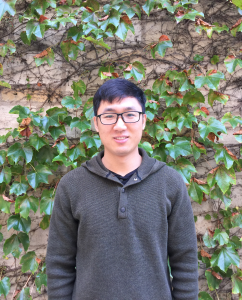
A strong foundation at Iowa State University has helped to set up a mechanical engineering alum for success at his next adventure as a researcher at Northwestern University.
Bowei Zhang grew up in Jingshan, a city in central China. He attended Wuhan University of Science and Technology where he graduated with an undergraduate degree in metallurgy engineering. He moved to Ames in 2016 to pursue a Ph.D. in mechanical engineering (ME). While at Iowa State University, he worked in the lab of Shan Hu, an associate professor of ME.
“Our research goal was to construct advanced photo-electrochemical nano-catalysts to generate clean and sustainable hydrogen fuel from water more efficiently at low price and then promote the further deep-decarbonization of the global energy system by the replacement of traditional fossil fuels,” Zhang said.
Zhang explained that a series of record-high conversion efficiencies were achieved when the researchers were able to optimize the coupling reactions of hydrogen evolution and oxygen evolution in a water-splitting system. The researchers had a strong understanding of the underlying dynamic mechanisms from both experimental and theoretical viewpoints. This research was built upon previous research he had done with Hu, who also serves as the William and Virginia Binger Professor in Mechanical Engineering.
As a graduate student at Iowa State, Zhang co-authored 15 papers, eight of which he was the first author. He was a Catron Fellow and also received the Chinese Government Award for Outstanding Students Abroad. Locally, he received a Research Excellence Award from the ISU Graduate College, as well as a Graduate and Professional Student Senate Research Award. Additionally, he was the 2020 recipient of the Zaffarano Prize, which ISU’s Graduate College awards “annually to graduate students who show superior performance in publishing research in academic journals,” considering “both the quality and quantity of publications when selecting a winner.”
 “I felt excited and was encouraged that my efforts were being recognized when I heard that I would receive the Zaffarano Prize,” Zhang said.
“I felt excited and was encouraged that my efforts were being recognized when I heard that I would receive the Zaffarano Prize,” Zhang said.
Zhang’s dissertation, “Advanced manufacturing and nanotechnology for non-noble metal-based oxygen evolution electrocatalysts,” further built upon his work in Hu’s lab. After completing his Ph.D. in fall 2019, Zhang began work as a postdoctoral fellow with The Odom Group at Northwestern University. For this, he was able to take the knowledge he learned in solid-state mechanics and photo-electrochemistry at Iowa State and apply it to his work.
“My research projects at Northwestern focus on two aspects,” said Zhang. “First, we looked at thin film mechanics for soft materials and 2D materials, which can be used for wearable electronics. Second, we examined plasmonic catalysis in which the solar energy can be converted and stored into sustainable fuel.”
After the postdoctoral appointment Zhang plans to pursue a career in either academia or industry, with a focus on research and industry applications. Zhang said it was the strong mentoring from faculty at Iowa State University that helped to get him where he is today.
“Thanks to my Ph.D. advisor Professor Shan Hu for the great support during my study at Iowa State, which was among the best memories for me,” Zhang said. “Also, I would like to thank Professor Wenyu Huang from the chemistry department for his generous help in my research projects.”